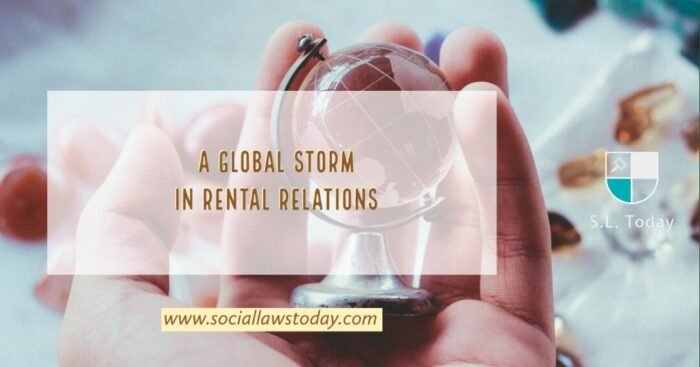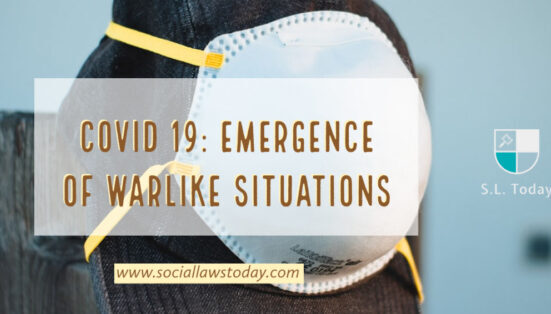Rental relations
A global rental storm has hit the world and in order to curb the situation, enforcement of a long term policy is the need of the hour. An idle situation would be to take a pragmatic approach between the tenants and the landlords.
Sanjica & Punya Mehrotra, 21 August, 2020, 8:30 PM IST
Introduction
“In the words of Sequoia Capital, one of the world’s foremost venture capital firms, Coronavirus is the ‘Black Swan of 2020’. As black swans are rare, so is this deadly virus”.
After several weeks of restrictive laws to minimize the impact of the coronavirus (Covid-19) —business owners and landlords are required to make difficult decisions. People’s ability to spend money is no longer what it used to be. This hasa significant impact on the relationship between landlord and tenant.
Covid-19 has resulted in substantial drop of rental rates since sources of income have been stressed and tenant’s ability to earn and pay has significantly reduced. Lockdown has led to the relocation of many tenants; while those still in occupation face uncertainty in their current tenancy agreements. Although there is no clear picture of how rental relations will proceed in Covid times, some deliberations can be made by studying methodology adopted by few countries to deal with such situation and their effect on rental market in future.
Temporary Relief By Some Governments
Around the world, governments have intervened in the rental contractual relations to mitigate financial hardship faced by the tenants as well as the landlords to secure momentary market stability. They have released guidelines in order to stabilize commercial rental agreements during this pandemic.
The government of Singapore has laid down remedy for tenants who are unable to pay rent due to the outburst of the virus. The tenants are supposed to issue a notice to the landlord, guarantors or sureties (if any) explaining their economic hurdle. As a result of issuing such notice, and pursuant to the COVID-19 Act, the landlord cannot take action to foreclose the lease, re-enter the premises or evict the tenant for non-payment of rent during the COVID-19 period.This respite given to the tenants is for a limited period, till the time the threat prevails and it does not waive the rental payment obligation.
The Irish and the Spain governments have shown a similar approach while fighting the rental difficulties laid down by the lockdown. Both governments have introduced a blanket ban on rental hikes and termination of tenancy till the time peril persists. Similarly, New Zealand has announced a freeze on rental hikes for a period of six months and extended the no cause termination period by three months. These measures will support New Zealanders to stay in their rental properties with a six-month freeze on residential rent increases and increased protection from having their tenancies terminated.Various other countries have also implemented temporary guidelines in order to solve the rental dispute.
Also read: Practice of Inhumanity: Capital Punishment
Vishal Kumar Jha
Aftereffects Of Covid 19
Even though the temporary relief favors the tenants but the aftermath has a petrifying future in store for them. The countries around the world have provided a safe house for the tenants for the time being, till the pandemic prevails but no country has completely waived off the obligatory payments. This brings the tenants in an unfavorable situation, as they suffered the loss of entering their rental premise and are still expected to pay rent for those months.
The uncertainty of this outbreak has scared the economy. The only certainty that prevails is the impending litigation fights which will begin as soon as the temporary relief laid down by all the governments around the world will come to an end. People will go knocking the doors of the judiciary for providing a permanent solution to the problem.
Another downside of Covid 19 is that, we find many retail tenants filing for bankruptcy as they are finding themselves incapable to survive this economical tsunami. One such example is that of the world’s largest co-owned gym chain, the Gold’s Gym. It was forced to close numerous branches all around the world and has blamed Covid 19 the sole reason for insolvency proceedings.The pandemic was the final blow to JCPenney, a 118-year-old company that blamed Covid for the crisis as the cornerstone of its hurried collapse that pushed the corporation into bankruptcy. Luxury brands like Victoria’s Secret and famous beverage retailer like Starbucks are closing their stores down.
The companies are finding it impossible to keep themselves afloat due to their incapacity to pay the expensive rent in absence of any business. One such example is that of the famous fashion brand Zara. It is one of the world’s largest clothing merchant who has faced a downfall of 44% in their sale during this pandemic and is now resorting to closing 1200 stores around the world as they are unable to keep up with the economic situation. Monsoon & Accessorize have faced similar difficulties and are forced to close many of its stores in United Kingdom, as the landlords refuse to waive of the rent.
Applicability of Legal Principles
In the court of law tenants can seek shelter under the Legal Principles mentioned below.
1. Doctrine of Force Majeure and Contract of Frustration
The term is used as a convenient label to refer to a predetermined stipulated condition or a supervening superior power that prohibits anyone from performing their part of the contract.The mere occurrence of a force majeure event is not, in itself, a reason to be excused from performance. The tenant cannot rely on the force majeure clause without attempting to mitigate or seek various ways to perform the contract and has to establish causal connection between the outcome of the event and the hindrance it has caused to the contract.
There is a popular notion that, in the absence of a force majeure clause within the contract, the principle of “Frustration of Contract” can be come to play. Occurrence of COVID-19 may be cited as an event that made it impossible or impracticable to fulfill obligations under the rental agreement, and therefore the contract is ‘frustrated.‘
2. Rebus Sic Stantibus
The implementation of the rebus sic stantibus theory (‘things thus standing’) may also be assessed. This principle allows the modification of the terms of the contract to be made in cases of overlapping of the impossibility of performance of the contract due to the impermissibility of the change of circumstances.This can be taken as anaberrantto the concept of “Pacta sunt servanda” (the contract is the law between the parties).In order to seek this defense, it is important to determine the actual effect of Covid-19 on the contractual relationship under review. Hence applicability of this principle will vary from case to case.
3. Constructive Eviction
Tenants may also seek to rely on the Common Law Principle of Constructive Evictionto argue violation of the Quiet Enjoyment Agreement. In order to make use of one of these ideas, the tenant typically needs to prove fault on the part of the landlord.The presence of deadly virus and the imposition of restrictions to combat it are rarely sufficient. Nonetheless, negligence on the part of the landlord in addressing the risk of contagion during this pandemic may support the tenant’s argument under one of these doctrines.
Way Ahead
Facing such uncertainty in time like this is the biggest fear ofthe government all around the world. Certain precedential situations to fight the effects of this pandemic in order to restore economic stability are discussed further.
The principle of Comparative Hardship will reap benefits to both the parties in a rental dispute.A middle ground for negotiation will be considerable in the current scenario.While this is not a legal argument, it would encourage the parties to find a mutually beneficial solution to prevent misery in distressing times. It can be observed that a similar approach was taken during the SARS outbreak in 2002 – 2003. Most courts in China held that rent should be reduced during the SARS period, and the amount of rent reduction depended on the specific situation.
Another explication could be the economic support from the government.The UK government has announced ‘Triple Lock’ system in order to ensure rental protection. This includes an instant increase in the welfare support system for the renters to protect them from eviction once the temporary suspension of rental payment is lifted and to scrap off so-called ‘no fault’ section 21 evictions under the statue. The Australian government has also announced a $440 million six month support package to allow landlords and tenants to negotiate on rental payments when households have lost at least 25% of their income.
A global rental storm has hit the world and in order to curb the situation, enforcement of a long term policy is the need of the hour. An idle situation would be to take a pragmatic approach between the tenants and the landlords. The uncertainty associated with the span of the pandemic will create obstacles, and recovery will depend on how countries cope with the pandemic. Governmental support in times like these might be the only solution to ensure speedy revival of the country.
Rental Relations


Leave feedback about this